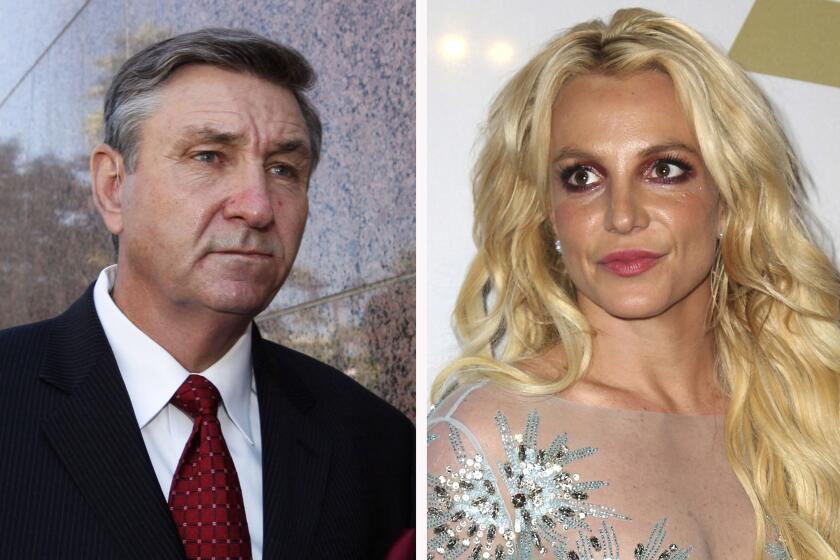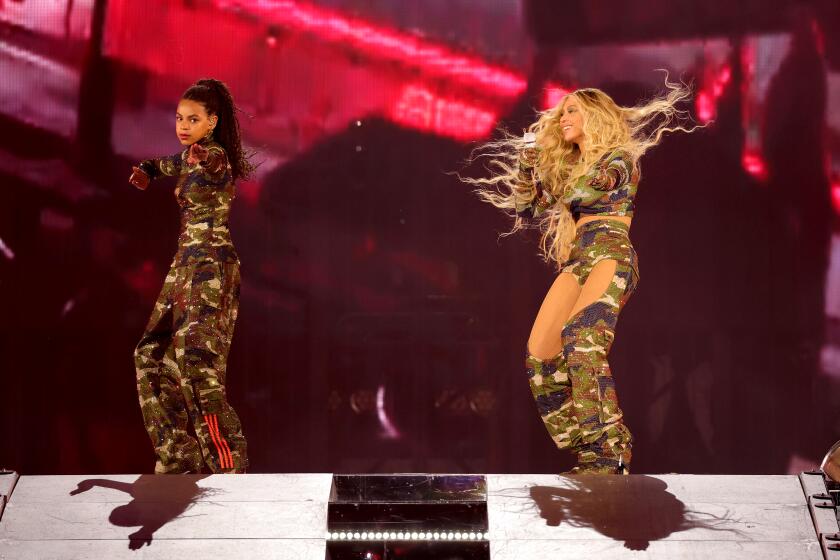Haley Reinhart’s bumpy, sincere road to ‘Idol’s’ top 3
Say it with me: Haley Reinhart. The name of “American Idol’s” reigning big surprise doesn’t quite roll off the tongue, does it?
“Idol” never simply crowns a voice; it defines a brand. The details define and reinforce a contestant’s appeal, from back story to song choice to sartorial style to naturalness onstage.
Reinhart, now one of the show’s three survivors, has taken quite a while to get herself together as a marketable star. Her slow, uneven evolution contrasts strikingly with that of her two remaining rivals.
Scotty McCreery, whose handle could easily belong to one of the baseball heroes he so admires, has been solid from the get-go. His vocal limitations as a baritone are a seeming reflection of his traditional values and straight-shooting personality. The first likely winner to combine two staple “Idol” qualities — tween idol crushworthiness and country roots —McCreery quickly outgrew novelty status by making clear how simple it would be for 19 Entertainment, the management company behind “Idol,” to market him.
Lauren Alaina has followed a parallel path, though with somewhat more obvious coaching. Having lost her clunky Southern surname (Suddeth) before her first audition — was that producer Simon Fuller’s idea? — this definitive ingénue has lost weight, glammed up her style and figured out how to cope with pop’s secular side without altering the throaty church-girl twang that had the judges jumping at her as fast as they could say “Carrie Underwood.”
Reinhart’s “Idol” journey offers a striking contrast. Introduced as a Season 9 reject in her audition reel and then nearly losing her spot after a big stumble during Hollywood Week’s group round, Reinhart has been a consistent near-loser, biting her knuckles in the elimination round’s bottom grouping four times.
The judges pick apart her performances while heaping sugar on everyone else, criticizing her song choices and sometimes deriding her signature Etta James growl as a tuneless shout. The media, too, had a hard time focusing in on her, at first only giving her attention as the rumored squeeze of this season’s cuddle-bear, Casey Abrams.
As the race draws near its end, though, Reinhart’s brand identity has begun to coalesce, and it fits more neatly into conventional “Idol” constructs than anyone might have initially suspected.
Though she lacks both the dramatic back story of neurologically challenged rocker James Durbin and the comical charm of her pal Abrams, Reinhart beat both partly by fulfilling a classic “Idol” narrative through a vehicle that, this season, has mattered surprisingly little: her actual performances.
This season has been unusual for several reasons — new judges, of course, and a singing cohort that’s both notably young and remarkably confident onstage. But the most pronounced difference between this year’s “Idol” and those previous is that nearly every member of the Top 13 came in fully formed and committed to a particular style.
We’ve seen all these characters before, on “Idol” and in the solid middle of the pop world, where devoted cult audiences maintain steady careers. Pia Toscano was the big-note belter; Paul McDonald, the scruffy indie dude. We had a multi-instrumentalist jazzbo and a hippie chick. Jacob Lusk troubled the water by being a “miva,” a male diva, but while always interesting gender-wise, that’s hardly a new musical category.
Coming in so well-formed, few “Idol” hopefuls this year had much chance to actually grow through their performances. New judges Jennifer Lopez and Steven Tyler have gotten much guff for soft-balling their critiques, but in truth, there hasn’t been much for them to work with. These kids knew who they were and were there, basically, to sell themselves.
Only Reinhart has offered a series of musical performances that shed light on her internal development. She started out technically impressive but a little callow, a show poodle. Over time, she connected with her material and began to tell us the story of herself.
Reinhart’s moments onstage trace the growth of an ingénue’s coming of age, a path marked by surmountable mistakes and feisty decisions to keep fighting. Unlike the neurotically wholesome Alaina, who once declared herself afraid of the very word “evil” and who never projects the least bit of sexuality or believable pain, Reinhart has been able to explore those key aspects of becoming an adult. At 20, she is a woman, not just a poster girl.
Twice now, Reinhart has enacted this coming-of-age process within a single episode. Two weeks ago she took a risk to sing Lady Gaga’s relatively unknown and laid-back ballad “You and I,” and the judges panned her. She got her revenge with a fiery “House of the Rising Sun” that tackled the feeling of regret and blew it to smithereens.
The following week, she climbed out of the hole of a really bad song choice — Michael Jackson’s bathetic “Earth Song” — to stun everyone with a startlingly wise reading of the Italianate ballad “I Who Have Nothing.”
These moments in which Reinhart has claimed what the musicologist and “Idol” watcher Katherine Meizel calls “personal artistic authenticity” — the quality of being able to connect the specifics of your life with those of a song — recall others, such as David Cook and Fantasia Barrino, who made “Idol” more exciting by playing their victories as motivated by emotional leaps of faith.
Reinhart is reminiscent of one other popular television figure: Rachel Berry, the character Lea Michele plays on “Glee.” Millions of Gleeks have become immersed in the story of that showbiz kid as she’s struggled to manage both her talent and her fluctuating feelings. If “American Idol’s” main mandate this season has been “stick with your brand and work it,” the spirit of “Glee” — an embrace of both artistic and personal openness — has found an advocate in Haley Reinhart.
More to Read
The biggest entertainment stories
Get our big stories about Hollywood, film, television, music, arts, culture and more right in your inbox as soon as they publish.
You may occasionally receive promotional content from the Los Angeles Times.






